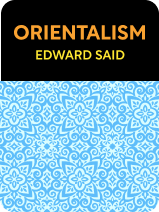

This article is an excerpt from the Shortform book guide to "Orientalism" by Edward Said. Shortform has the world's best summaries and analyses of books you should be reading.
Like this article? Sign up for a free trial here .
What is modern Orientalism? What differentiates it from its old, pre-war state? What was the change that spurred this differentiation?
When scholars talk about modern Orientalism, they typically refer to the state of the discipline after WWI. It was at that time that there was a shift in the core assumptions of the subject, specifically the notion that the people of the Orient were unchanging through time.
Keep reading to learn more about modern Orientalism.
Modern Orientalism: The Tides of Change
After World War One, European scholars working in academic disciplines dealing with studies of Asian history and culture began to approach their subject in a different way.
They studied the East in the hopes of learning from it, thereby rejuvenating the West and easing the cultural crisis and alienation brought on by the experience of war, violent ethno-nationalism, and economic depression. They emerged with a recognition that the West needed the East as much as vice versa. As Europe descended into the horrors of fascism, the Orient seemed to be bursting with new potential and developments that pointed toward the region playing a major role in the global future: Arab nationalism, self-determination, the Zionist movement, and the economic power of oil. The East was flowering; the West seemed to be entering a new dark age.
With the postwar rise of independence movements across the Middle East, it became clear that the Orient was indeed a dynamic and changing place, whose peoples yearned for self-determination. The Orient could now be seen as an entity that acted on its own, rather than one that was merely acted upon. Accordingly, a new generation of scholars began to study cross-cultural synthesis, writing about how Europe and the Orient had influenced one another at crucial junctures throughout history, instead of presenting it as a one-sided exchange.
Despite these readjustments in scholarly focus in other fields, however, modern Orientalism was still rooted in its fundamental “us and them” outlook. As we’ve emphasized, a central tenet of Orientalism was that the people of the Orient were unchanging through time. This belief, which the Orientalists accepted as an unquestionable fact, made Orientalism as a whole resistant to change or revision. To accept the dynamism of Arab or Islamic society and its power to act would be to undermine the very edifice of Orientalism.
Indeed, comparative cultural analysis only made the Orientalist world (particularly those scholars dealing with the Islamic Orient) more aware of the fundamental and irreconcilable differences between East and West. This was largely due to these Orientalists’ fixed ideas about Islam. They saw Islam as fundamentally incompatible with modernity. Increased study of Islamic texts and sources could only confirm them in this belief.
Example: H.A.R. Gibb and the East-West Divide
The Orientalists strove to maintain the barrier between East and West. For scholars like H.A.R. Gibb (1895-1971), keeping this wall of separation intact was paramount. As we’ve seen, the West had defined itself since ancient times in opposition to the East. If these lines were to become blurred, the West might find itself without an identity of its own.
This was a major reason why figures like Gibb remained steadfastly opposed to modern political developments like Arab nationalism. The success of the national independence movements threatened to knock down the barriers between East and West and possibly even put the East on equal footing with the West.
Thus, despite the changes taking place within other academic disciplines during this era, Semitic or Islamic Orientalism remained insular and backward-looking in its outlook and core assumptions. It continued to root the region’s complex contemporary conflicts and political problems in ancient, Biblical sources—such as explaining the emerging Israeli-Palestinian conflict through the lens of the Old Testament story of Isaac and Ishmael (In the Hebrew Bible, or Tanakh, Isaac is the true heir of the Abrahamic covenant with God; in the Quran, the holy book of Islam, this figure is Abraham’s other son, Ishmael). Twentieth-century Orientalists saw these conflicts as manifestations of an “eternal” struggle between East and West, a clash of civilizations brought on by the ancient hostility of the East toward the West.
Yet, in spite of its increasingly clear failures to describe reality, Orientalism remained a discipline in good standing well into the modern age, with works on topics such as “the Islamic mind” or the “Arab character” continuing to find publication in elite academic journals throughout the 20th century.
Israel, the Arabs, and Modern Orientalism
The 1948 creation of the State of Israel was a watershed moment in 20th-century relations between the West and the Muslim world.
The creation of the Jewish state and the subsequent Israeli victory in the 1947-1949 Palestine War resulted in the displacement of hundreds of thousands of Arab Muslim Palestinians and the annexation of Palestinian land—a political crisis that continues to this day.
Western journalistic accounts reduced this complex humanitarian, political, sectarian, and economic conflict to familiar colonial and Orientalist tropes. In this narrative, brave and heroic Jewish Israeli settlers were forging a new homeland on the lands where their ancient forebears had once ruled.
Like their British and French colonial forebears who wished to bring civilization and modernity to the benighted Arabs, these modern-day Israeli pioneers were planting the seeds of civilization in the face of barbaric, murderous opposition from the Palestinian Arab hordes. This narrative harkened back to the colonial myths promoted by figures like Kipling and Lawrence, with Israelis fulfilling the postwar version of the “white man’s burden” to civilize and tame the Orient.
Example #1: “Do the Arabs Want Peace?”
Western media commentators and public officials (especially in the United States) refused to acknowledge the legitimacy of Palestinian objections to the Israeli military occupation and subsequent construction of Jewish settlements on lands seized from Palestinians.
Palestinian resistance to Israel was dismissed as being based in ignorance, religious mania, and violent anti-Semitism. Palestinians were simply “terrorists,” irreducibly barbaric and hellbent on Israel’s destruction. This was a modern replay of the old Orientalist trope of Arabs being driven entirely by passion and emotion—it was not possible for them to be motivated by rational political concerns. They could only be the essentially violent and irrational people they had always been.
This modern spin on Orientalism was expressed by writers like the American political scientist Gil Carl Alroy (1924-1985), who argued that the Arabs were inflexibly opposed to peace and could not be trusted to abide by any political settlement in his 1974 article “Do the Arabs Want Peace?” published in Commentary magazine.
Yet again, here was a Western commentator purporting to speak with authority on the essential character and mind of an entire culture. It was the role of the Orientalist to write; it was the role of the Orient to be written about.
The Israeli-Palestinian conflict provided fodder for the Western academic press, with books featuring titles like Temperament and Character of the Arabs continuing to be published.
Such works pathologized and delegitimized anti-colonialism and pan-Arabism as perversions of the natural order and deviations from the essential, unchanging Arab mindset—which was to be politically impotent and submissive.
Example #2: Bernard Lewis and Muslim Anti-Semitism
Perhaps the most famous and influential of modern Orientalism writers was the British-American historian and public intellectual Bernard Lewis (1916-2018), who was among the editors of the Cambridge History of Islam, the shortcomings of which we discussed earlier in this chapter.
Lewis was a ubiquitous presence in academic journals and a frequent television commentator in the United States in the 1970s, 80s, 90s, and 2000s. With his sonorous voice and erudite style, Lewis presented himself as a serious, sober scholar imparting “objective” wisdom about the Arab world.
Yet Lewis was steeped in the same Orientalist tradition that had hampered the perspectives of Western commentators on the East since the 18th century. He believed that Islam was fundamentally unchanging and that this fact could explain most of contemporary Middle Eastern politics. Lewis infantilized the Orient, arguing that political upheavals like the Egyptian Revolution of 1919, the Iranian Revolution of 1979, and the Arab Spring of 2011 were temporary excitements, bursts of passions that would eventually die down when the Arabs reverted to their essential political submissiveness.
An ardent supporter of the Israeli position in the Israeli-Palestinian conflict, Lewis argued that Islam was an inherently anti-Semitic faith, motivated by irrational hatred for the Jewish people. In reducing Arab Muslim grievances to pathological, murderous anti-Semitism, Lewis ignored substantive objections to specific Israeli policies, including:
- The Israeli military occupation of the West Bank, Golan Heights, and the Gaza Strip
- The construction of Jewish settlements on land held under military occupation, in violation of international law
- The denial of immigration rights to Palestinian Arabs and the parallel Law of Return, which allows foreigners of Jewish ancestry to settle and obtain Israeli citizenship
For Lewis, these nuances were simply irrelevant to his preferred narrative of civilized (i.e., white European) Israelis against barbarous (i.e., Arab Muslim) “Orientals.”

———End of Preview———
Like what you just read? Read the rest of the world's best book summary and analysis of Edward Said's "Orientalism" at Shortform .
Here's what you'll find in our full Orientalism summary :
- How Western society invented the concept of Orientalism
- Why "the Orient" was thought of as a different, exotic, and dangerous place
- How Orientalism was central to European colonialism






